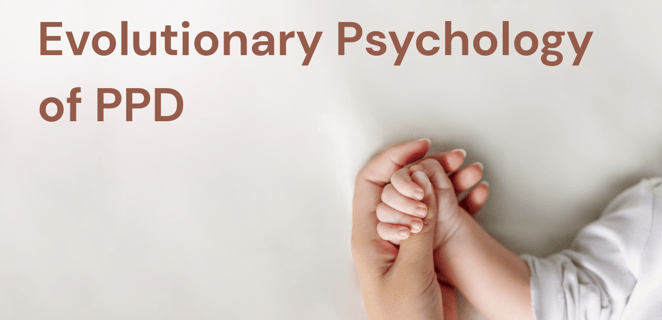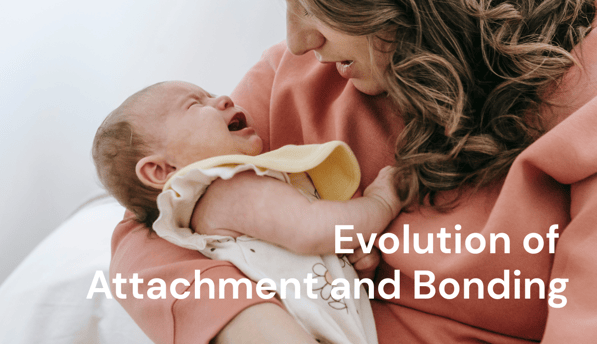The Evolutionary Psychology of Postpartum Emotions
6/25/20254 min read


Childbirth is not just a physical milestone—it’s a profound psychological transformation. New parents often experience an emotional landscape that is as intense and unpredictable as labour itself. From overwhelming love to unexpected anxiety, these feelings can be confusing. But what if some of them aren't “problems” to fix, but adaptive responses shaped over millennia?
This is the lens of evolutionary psychology, which asks: Why do we feel what we feel after childbirth? What purpose might these emotions serve in human survival? By viewing postpartum emotions through this perspective, we gain not only understanding but also a deeper sense of compassion for the complexities of early parenthood.
At Peace Temple, we often remind new mothers and fathers: your feelings make sense—not just personally, but historically and biologically. Here’s what the science suggests.
The Paradox of Postpartum: Love and Vulnerability
In the hours, days, and weeks after birth, many parents report experiencing a strange mix of deep affection and intense fear. One moment they’re captivated by their baby’s tiny face; the next, they’re overwhelmed with anxiety, fatigue, or grief. While modern life may call this “emotional instability,” from an evolutionary standpoint, it’s much more purposeful.
Hyper- Attunement for Infant Survival
New born are helpless. Their survival depends on constant, attentive care. The postpartum mind becomes wired for this task—heightened sensitivity to cries, the urge to check if the baby is breathing, and a protective instinct against perceived threats. These behaviors are not random; they are rooted in evolutionary fitness.
Increased emotional responsiveness after birth may have historically ensured that a caregiver could quickly respond to illness, predators, or environmental dangers. What feels like over-worrying today was once a survival asset.
Peace Temple’s therapy programs acknowledge these instincts, helping parents balance vigilance with self-compassion.
Postpartum Anxiety: Adaptive or Disordered?
It’s normal to feel on edge after bringing a baby into the world. But when does that anxiety become harmful?
Evolutionary psychology suggests that a certain degree of postpartum anxiety may have historically helped parents remain alert and responsive during a dangerous time. Mothers who were anxious may have been less likely to leave their infant unattended, more likely to notice illness early, and quicker to mobilize in times of threat.
That said, our environment has changed dramatically. The threats once faced—wild animals, disease, tribal warfare—are now replaced by social media comparisons, work stress, and identity crises. When the biological system that once protected us gets triggered by modern anxieties, it can lead to chronic stress or postpartum anxiety disorders.
This is where therapy steps in. At Peace Temple, we help parents distinguish between adaptive concern and excessive distress, offering tools to recalibrate the nervous system.
The Role of Postpartum Depression in Evolution
It’s controversial to suggest that depression could have an evolutionary purpose—but evolutionary psychologists have explored this possibility. Some theories argue that postpartum depression may serve a signaling function—alerting the mother (and her community) to unmet needs.
For example:
A mother feeling overwhelmed might be in a resource-scarce or unsupported environment.
Depressive symptoms might signal a need for rest, help, or social change.
Emotional withdrawal could be a protective response, minimizing exposure to threats or reducing conflict.
Of course, this does not mean postpartum depression should be left untreated—quite the opposite. But viewing PPD through an evolutionary lens can reduce shame and increase self-understanding.
At Peace Temple, we emphasize that emotional signals should not be ignored—but gently interpreted and honored through support and care.


The Evolution of Attachment and Bonding
Postpartum emotions also serve one of evolution’s most vital roles: bonding. The hormonal floods of oxytocin, the pleasure derived from skin-to-skin contact, and even the emotional highs and lows of parenting all help secure the deep attachment between parent and child.
Attachment isn’t just about feelings—it’s survival. Human infants, unlike other mammals, are born neurologically underdeveloped. Their survival depends not just on food and warmth but on emotional connection.
Even negative feelings—guilt, fear, or sadness—can reinforce attachment. A mother who feels guilty for missing a feeding or anxious about separation may be more likely to stay close to her baby. In evolutionary terms, these emotions were tools for protection.
Peace Temple’s attachment-based therapies help parents understand that bonding doesn’t have to be perfect—it just has to be present, responsive, and real.
Paternal Emotions: The Evolving Father Role
Evolutionary psychology once focused largely on mothers, but recent research has explored the emotional shifts fathers experience too. After a child is born, men can also undergo hormonal changes—lower testosterone, higher prolactin and oxytocin levels—which promote caregiving behaviours.
Fathers who are emotionally engaged help ensure family survival and child development, especially in cooperative parenting societies. Postpartum emotional sensitivity in men may thus be part of an evolving role from “protector” to “nurturer.”
At Peace Temple, we welcome fathers into the postpartum emotional conversation, validating their experiences and guiding them toward healthy coping strategies.
Modern Mismatch: Ancestral Brain, Modern World
Here’s the challenge: our emotional wiring was designed for a very different world. Our ancestors lived in close-knit tribes where child-rearing was a shared effort. Today’s parents, especially mothers, often find themselves isolated—without the “village” once central to human childrearing.
The result? Emotions that were once adaptive can feel overwhelming or maladaptive in modern contexts. This mismatch creates friction—and often, unnecessary suffering.
That’s why community and professional support are not luxuries; they are evolutionary necessities in a modern form. Peace Temple’s group therapy circles and one-on-one support services help recreate the communal safety our brains are still wired to expect.
Final Thoughts: Ancient Emotions, Modern Healing
Postpartum emotions are not random or shameful. They are ancient signals, born from thousands of years of evolutionary refinement. They are calls for connection, caution, caregiving, and rest.
Understanding these emotional shifts through the lens of evolutionary psychology doesn’t replace treatment—it deepens it. It reminds parents that their minds and bodies are doing exactly what they were designed to do, even when those responses no longer fit today’s environment.
At Peace Temple, we bridge the wisdom of evolutionary psychology with the compassion of modern therapy—so that every parent feels seen, understood, and supported.
Because no one should have to navigate ancient emotions in isolation.
